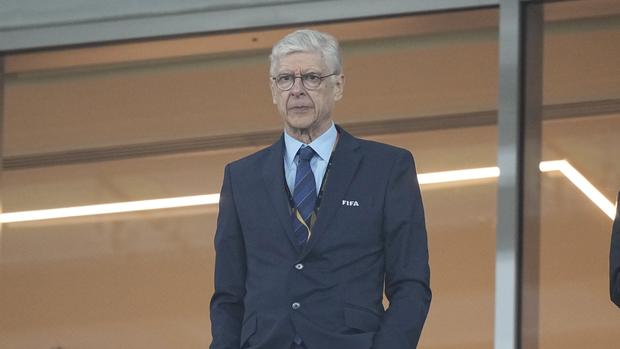 Former Arsenal coach Arsene Wenger stands on the tribune before the World Cup group G soccer match between Serbia and Switzerland, at the Stadium 974 in Doha, Qatar, Dec 2, 2022. (MARTIN MEISSNER / AP)
Former Arsenal coach Arsene Wenger stands on the tribune before the World Cup group G soccer match between Serbia and Switzerland, at the Stadium 974 in Doha, Qatar, Dec 2, 2022. (MARTIN MEISSNER / AP)
AL RAYYAN, Qatar - The group stages of the World Cup saw a staggering 83 percent rise since the last tournament in goals scored in open play that came from the flanks, a trend Arsene Wenger believes will determine who wins the competition.
Discussing a technical analysis of the first round by world governing body FIFA, Wenger, who heads its global football development, said there was a trend of defences protecting the centre of the final third, meaning teams were forced to go down the left and right channels to create chances.
"The teams block the center of the pitch, so they open more on the flanks... it means the best teams who have the best wide players have the best chance to win the World Cup," Wenger said in a presentation in Qatar on Sunday.
ALSO READ:Soccer-Age gap no problem for France's deadly striking duo
Another big change was how often goalkeepers made themselves available to receive passes to their feet, up from 443 times during Russia's group stages to 726 times in Qatar
Juergen Klinsmann, who is a member of the FIFA Technical Study Group, said the pattern of packing the defence was also impacting the number of attempts to shoot on goal from outside the area.
"It's really difficult for teams to break through the middle," he said. "Defensive and midfield lines are so close together there's no chance to pull the trigger."
That defensive pattern also led to a 33 percent reduction since the 2018 World Cup in Russia in the number of "take-ons", or players in possession of the ball running at defenders and beating them, while many were being forced out wide.
ALSO READ:France beat Poland to reach World Cup quarter-finals
Klinsmann said the data showed this favouring South American teams far more than Europeans.
"It's their way of doing things. It's the love for the street football games still... the kids take on each other, one against one. So it's not surprising that they're leading on this," he said.
Another big change was how often goalkeepers made themselves available to receive passes to their feet, up from 443 times during Russia's group stages to 726 times in Qatar.
"This means the technical level of a goalkeeper distributing with has feet has become a vital element of quality of a team," Wenger said.
ALSO READ: 'Miraculous' Croatia ready for similar-styled Japan
"He is becoming a real part of the team; now they're part of the team, it's the modern part of the team."
Wenger said the larger amounts of stoppage time at the end of the matches in Qatar was having little impact on games, but could add to physical demands on players.
He also said he favoured the increase in the number of World Cup teams from 32 to 48 in 2026, saying it would encourage countries to raise their domestic standards.
"It means that we will have to find 16 more good teams," he said. "I'm convinced that if countries have more opportunity to go for the world stage they do more in that country."


